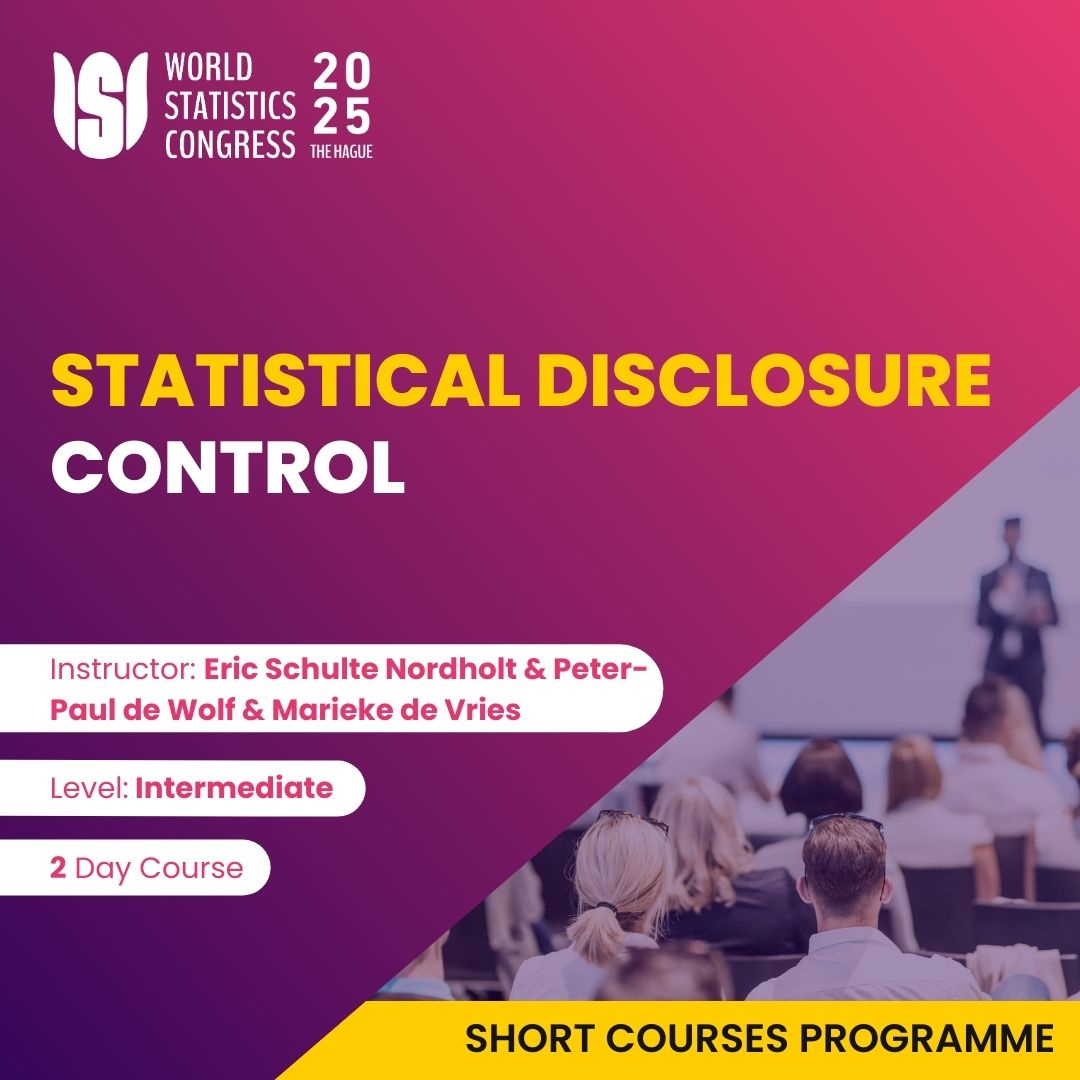
For more details on registrations and submissions for the Statistical Disclosure Control, please first login to your account. If you do not have an account then you can create one below:
The objective of this course is to provide the participants with an overview of Statistical Disclosure Control (SDC) theory and methods related to tabular data protection and microdata protection, as well as the respective software. The course covers:
After the course the participants will have a better understanding of the theory, methods and software used in SDC for tabular data and microdata protection.

Eric Schulte Nordholt studied mathematics at the University of Utrecht and econometrics at the Erasmus University Rotterdam in the Netherlands. He is a senior researcher and project leader at Statistics Netherlands. After graduating in Mathematics and Econometrics, Eric Schulte Nordholt joined Statistics Netherlands in 1992. He first worked in the department of Statistical Methods and since 1996 he is working in Social Statistics. In 1995 he had a secondment at Eurostat in Luxembourg and in 2006 at Statistics New Zealand. Eric Schulte Nordholt is Statistics Netherlands’ advisor on the Statistical Disclosure Control of social data. He is responsible for the Dutch register-based census where all tables are estimated based on already existing data sources (registers and surveys). Eric Schulte Nordholt acted as an observer in the Censuses of 2011 (in Kosovo) and 2013 (in Bosnia-Herzegovina) on behalf of the Council of Europe. He presented his work at various conferences and has published in different refereed journals. He is regularly giving lectures and statistical courses. Since 2018 he is international coordinator of social statistics at Statistics Netherlands and since 2020 he is chair of the steering committee of the UNECE Expert Group on Population and Housing Censuses. Eric Schulte Nordholt is a member of the ISI, IAOS, IASS and Netherlands Society For Statistics and Operations Research.

Peter-Paul de Wolf graduated cum laude and earned his PhD in mathematical statistics at Delft University of Technology. He joined Statistics Netherlands in May 1996 and is currently senior methodologist specialized in Statistical Disclosure Control (SDC). As such, he coordinates the research at Statistics Netherlands concerning SDC, gives consultancy and is involved in proposing disclosure control policy. Moreover, he actively participates in Eurostat’s Expert Group on Statistical Disclosure Control and coordinated several European projects forming an international Center of Excellence on SDC. Peter-Paul de Wolf presented his work at several international conferences and has published in different peer-reviewed journals. Since 2015 he is chairing the organizing committee of the UNECE-Eurostat biannual expert meeting on Statistical Data Confidentiality. To disseminate knowledge on SDC, Peter-Paul de Wolf regularly gives lectures and courses on SDC at several (international) institutes. He is a member of the Netherlands Society For Statistics and Operations Research (VVSOR).

Marieke de Vries studied mathematics at Delft University of Technology, graduating in 2019 with a focus on stochastics. She has been working as a methodologist for Statistics Netherlands since 2020, specializing in Statistical Disclosure Control. She has worked on the European Guidelines for Statistical Disclosure Control Methods for Census and Demographics Data and presented her research at the UNECE Expert Meeting on Statistical Data Confidentiality. She also teaches multiple courses on Statistical Disclosure Control within Statistics Netherlands.
Staff dealing with statistical confidentiality issues.
Sound command of English. Participants should be able to make short interventions and to actively participate in discussions.
For more details on registrations and submissions for the Statistical Disclosure Control, please first login to your account. If you do not have an account then you can create one below:
We have placed cookies on your device to help make this website better.
You can change your cookie settings in your web browser. Otherwise, we’ll assume you’re OK to continue.
Some of the cookies we use are essential for the site to work.
We also use some non-essential cookies to collect information for making reports and to help us improve the site. The cookies collect information in an anonymous form.
To control third party cookies, you can also adjust your browser settings.
Do Not Accept Third Party Cookies